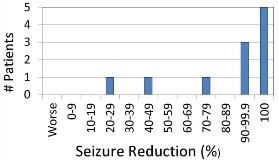Whole cannabis extract of high concentration cannabidiol may calm seizures in highly refractory pediatric epilepsies
Abstract number :
3.330
Submission category :
Late Breakers
Year :
2013
Submission ID :
1866676
Source :
www.aesnet.org
Presentation date :
12/7/2013 12:00:00 AM
Published date :
Dec 5, 2013, 06:00 AM
Authors :
M. M. Gedde, , E. Maa
Rationale: Despite constant but interval advances in antiepileptic drug (AED) pipeline development, a large unmet need still exists for therapies to address medically refractory epilepsies. This is particularly challenging in some forms of devastating pediatric epilepsy syndromes (Dravet, Doose, Lennox-Gastaut). Evolving pre-clinical and early clinical research suggests that cannabidiol (CBD), a nonpsychoactive compound found in the cannabis plant, may be a potent antiepileptic agent. A botanical extract from a strain of cannabis known as Charlotte s Web (CW Realm Oil, or Realm Oil), which contains CBD at a ratio of >16:1 relative to other cannabinoids, has recently become available in Colorado for medical use.Methods: Realm Oil is available for medical use under supervision by a Colorado treating physician in patients with appropriate state licensure for the use and possession of medical marijuana. Parents of children with severe, medically refractory epilepsy and who had received Realm Oil for at least three months were invited to participate in a survey of the effects of Realm Oil. Thirteen patients were identified that met criteria. Data regarding epilepsy diagnosis, general epidemiological information, baseline and post treatment seizure frequency, side effects, and average dose, were collected in a deidentified manner. Simple statistics were used for data analysis.Results: 11 of 13 patients (parents) completed interviews. 4 were diagnosed with Doose syndrome, 2 with Dravet syndrome, 1 with Lennox-Gastaut syndrome, 1 with metachromatic leukodystrophy, 1 with cortical dysplasia and 2 with idiopathic epilepsy. Patients had received an average of 10 AEDs in their lifetime. 11 of 11 patients (100%) reported reduction in weekly frequency of motor type seizures (generalized tonic-clonics plus tonic, myoclonic and atonic seizures). Of the 11, 8 reported 98-100% reduction, 1 reported 75% reduction, and 2 reported 20-45% reduction in weekly seizures at the end of three months. Seven of 11 patients achieved this reduction within the first month of treatment. At three months, 5 of the 11 patients (50%) were seizure-free. Of the 2 patients who have received Realm Oil for more than one year, both have continued to enjoy the seizure reduction attained after 3 months of Realm Oil treatment. Average therapeutic dose of CBD (as administered in Realm Oil) ranged from 4 to 12 mg/kg/day, in 2 or 3 divided doses. Realm Oil was remarkably well tolerated. Side effects included sedation and unsteadiness, similar to the profile of existing medications.Conclusions: While this sample size is small, high concentration CBD extract (Realm Oil) appears to reduce seizures in a highly refractory pediatric epilepsy population. Despite its being a whole plant extract, no psychotropic effects were reported, in keeping with previous clinical studies involving CBD. We propose that the results of this survey can inform the design of a large, randomized, double blinded, placebo-controlled efficacy trial to investigate Realm Oil as an adjunctive therapy in highly refractory pediatric epilepsies.
